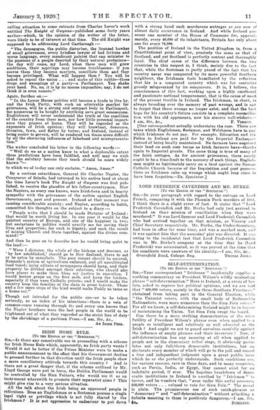SELF-DETERMINATION.
[To THE EDITOR OF TILE " SPECTATOR.")
Sol ,—Your correspondent "Irishman " incidentally supplies a scathing commentary on President Wilson's wildly misleading phrase "self-determination." Here is Ireland, at a crisis of her. fate, asked to express her political opinions, and we are told that " 600,000 voters, mainly in the three Southern Provinces," abstained from taking part in the General Election, while "the Unionist voters, with the small body of Redmondite Nationalists, were more numerous than the Sinn Fein voters." For all we know, a self-determining Ireland might be in favour of maintaining the Union. Yet Sinn Fein swept the board.
Can there be a more striking demonstration of the utter futility of President Wilson's phrase even when applied to a people so intelligent and relatively so well educated as the Irish ? And ought we not to guard ourselves carefully against the influence of empty phrases and their inventors ? Now, if self-determination has any meaning at all when applied to people not in the elementary tribal stage, it obviously postu- lates not only full-blown democratic institutions, but an electorate every member of which will go to the poll and record a free and independent judgment upon a great public issue which he or she perfectly understands. Such conditions are, for various reasons, rare in these days, and in many countries, such as Persia, India, or Egypt, they cannot exist for an indefinite period, if ever. The hopeless breakdown of demo- cratic institutions in Ireland is ascribed by "Irishman " to terror, and he wonders that, "even under this awful pressure, 600,000 voters . . . refused to vote for Sinn Fein." The moral is plain. The promiscuous use of such catch phrases as " democracy " and " self-determination" without attaching a definite meaning to them is positively dengerous.—I am, Sir,










































 Previous page
Previous page